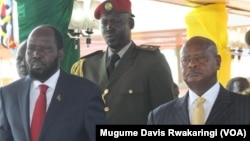South Sudanese may have little to cheer about as they mark the third anniversary of their country's independence in the midst of a seven-month-old conflict that has killed thousands and displaced more than 1.5 million, but they should not give up hope for their young country, analysts say.
President Salva Kiir and other politicians pledged on July 9, 2011 -- the day the world's newest nation was born after a long struggle for freedom from Sudan -- to improve the lives of South Sudanese, to build schools in all ten states within 100 days, and more, analysts recall.
But none of those promises has been delivered, and instead, the country has been mired in war since December, corruption is widespread, famine is looming and hundreds of thousands of people are living in appalling conditions in camps for the displaced.
Promise 1: peace deal that sticks
James Alic Garang, an analyst at the Juba-based Ebony Center for Strategic Studies, told South Sudan in Focus the first pledge Mr. Kiir has to deliver on is the signing of a peace deal that sticks.
Mr Kiir and his main rival in nearly seven months of conflict, former vice president Riek Machar, have signed several peace deals and ceasefire agreements, but all have been violated almost as soon as they were signed.
The regional bloc the Intergovernmental Authority on Development (IGAD) has been trying for more than six months to restore peace in South Sudan, but has so far had little success. Last month, IGAD put those Addis Ababa peace negotiations on indefinite hold.
When the negotiations finally get back on track, Alic said Mr. Kiir has to "... assure the nation that as peace returns, he will work on economic issues."
"Economic issues have taken a back seat in this country for years," Alic said. Mr. Kiir has to "give agriculture what it deserves, invest in infrastructure so that each South Sudanese has food on the table," he said.
Short, sad history
Alic said that since the signing the 2005 Comprehensive Peace Agreement that formally ended the war with Sudan, little has changed in South Sudan.
Independence in 2011 also brought little improvement to the lives of South Sudanese. In its first two years, the country teetered on the brink of a new war with Sudan after switching off its oil — South Sudan's only source of foreign revenue — amid a row with Khartoum over pipeline transit fees.
Gross domestic product fell from $2,300 per capita in 2011 to $1,100 in 2012, before inching up to $1,400 last year.
Buck stops with Kiir
"President Kiir has said a lot of things that he later failed to deliver," Alic said, calling on the president to do more to make good on his promises.
"He may say he is not the only one in the government, but he is the captain of the ship. The buck stops with him," Alic said.
Augustino Ting Mayai of the Sudd Institute said Mr. Kiir has to ensure that someone is held accountable for the millions of dollars that have gone missing from public coffers, and for human rights abuses that have been committed during the conflict.
In spite of the unrest and the government's shortcomings and outright failures, Mayai expects things will improve.
"People have the right to be pessimistic, but I think that there is potential for change in the country," he said.
"We should be hopeful... even though the president has failed in some areas in the past, we shouldn't always think that the future looks bleak," he said.












